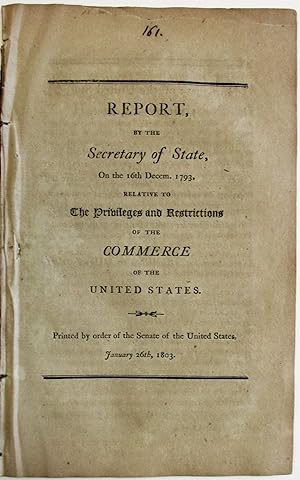report secretary state privileges restrictions di jefferson thomas (2 risultati)
FeedbackFiltri di ricerca
Tipo di articolo
- Tutti i tipi di prodotto
- Libri (2)
- Riviste e Giornali (Nessun altro risultato corrispondente a questo perfezionamento)
- Fumetti (Nessun altro risultato corrispondente a questo perfezionamento)
- Spartiti (Nessun altro risultato corrispondente a questo perfezionamento)
- Arte, Stampe e Poster (Nessun altro risultato corrispondente a questo perfezionamento)
- Fotografie (Nessun altro risultato corrispondente a questo perfezionamento)
- Mappe (Nessun altro risultato corrispondente a questo perfezionamento)
- Manoscritti e Collezionismo cartaceo (Nessun altro risultato corrispondente a questo perfezionamento)
Condizioni
- Tutte
- Nuovi (Nessun altro risultato corrispondente a questo perfezionamento)
- Antichi o usati (2)
Legatura
- Tutte
- Rilegato (Nessun altro risultato corrispondente a questo perfezionamento)
- Brossura (Nessun altro risultato corrispondente a questo perfezionamento)
Ulteriori caratteristiche
- Prima ed. (1)
- Copia autograf. (Nessun altro risultato corrispondente a questo perfezionamento)
- Sovracoperta (Nessun altro risultato corrispondente a questo perfezionamento)
- Con foto (2)
- Non Print on Demand (2)
Lingua (1)
Prezzo
- Qualsiasi prezzo
- Inferiore a EUR 20 (Nessun altro risultato corrispondente a questo perfezionamento)
- EUR 20 a EUR 45 (Nessun altro risultato corrispondente a questo perfezionamento)
- Superiore a EUR 45
Spedizione gratuita
- Spedizione gratuita in Italia (Nessun altro risultato corrispondente a questo perfezionamento)
Paese del venditore
Valutazione venditore
-
REPORT BY THE SECRETARY OF STATE, ON THE 16TH DECEM. 1793, RELATIVE TO THE PRIVILEGES AND RESTRICTIONS OF THE COMMERCE OF THE UNITED STATES. PRINTED BY ORDER OF THE SENATE OF THE UNITED STATES, JANUARY 26TH, 1803
Editore: [Washington, 1803
Da: David M. Lesser, ABAA, Woodbridge, CT, U.S.A.
EUR 439,40
Convertire valutaEUR 37,97 per la spedizione da U.S.A. a ItaliaQuantità: 1 disponibili
Aggiungi al carrello24pp. Disbound, else Very Good. The first American reprint of Jefferson's rare 1793 Report, explaining trading relationships with "the countries with which the United States have their chief commercial intercourse." With respect to each such country, Jefferson sets forth tariff and import policies. He is an eloquent voice for free trade. "Instead of embarrassing commerce under piles of regulating laws, duties and prohibitions, could it be relieved from all shackles in all parts of the world, could every country be employed in producing that which nature has best fitted it to produce, and each be free to exchange with others mutual surplusses for mutual wants, the greatest mass possible would then be produced of those things which contribute to human life and human happiness; the numbers of mankind would be increased, and their condition bettered." But as a practical man, he recommends that the United States enact "counter prohibitions, duties and regulations" on countries refusing to trade freely. AI 5476 [2]. Not in Rink, Eberstadt, Decker, Kress.
-
Report of the Secretary of State, on the Privileges and Restrictions of the Commerce of the United States in Foreign Countries
Editore: Printed for Childs and Swaine, Philadelphia, 1793
Da: James Cummins Bookseller, ABAA, New York, NY, U.S.A.
Prima edizione
EUR 8.348,56
Convertire valutaEUR 38,39 per la spedizione da U.S.A. a ItaliaQuantità: 1 disponibili
Aggiungi al carrello20pp. 8vo. First edition. First edition. 20pp. 8vo. This important report on the commerce of the United States was the last report made by Thomas Jefferson as Secretary of State, transmitted to the House of Representatives on Dec. 16, 1793, just two weeks before his resignation from the Cabinet and retirement to Virginia. Jefferson had long delayed making the report as he gathered more information. With his resignation already announced, effective at the end of the year, he submitted the document at the end of the Congressional session. According to Jefferson's biographer, Dumas Malone: "The paper embodied his thoughts over a long period about commerce and the economic development of the country . this was not the work of a mere theorist or inexperienced provincial, for its author had more direct contact with the problems of international trade than any other American in public life . Commerce loomed large in his mind . he now recognized the need for manufacturing in the future economy of the country. His report is notably well balanced and distinctly national in spirit." Jefferson had gathered statistics on trade since the beginning of his tenure as Secretary, at times with the aid of James Madison and Tench Coxe. He used these to describe in detail the imports and exports of the country, and its balance of trade with its major trading partners in Europe. "While considerably briefer than Hamilton's famous reports on banking and manufacturing, his paper can be properly compared to these as a source of factual information," Malone states. In the balance, Jefferson let the facts speak for themselves. The greatest enemies of American commerce were the interests of Great Britain and the restrictions Britain had placed on American trade to itself and its remaining colonies after the Revolution. Jefferson urged that the U.S. protect its own trade by placing restrictive tariffs on British products and negotiating trade treaties with other European powers, especially the French. He also suggested that American manufacturing would result in less dependence on foreign goods. Malone points out that in this regard, Jefferson and Hamilton were much closer in their beliefs than is usually thought. The Jefferson commerce report was the last of only seven published reports he made as Secretary of State in the slightly over four years he held the post. The others are the Weights and Measures Report, the Cod and Whale Fisheries Report, the coinage reports of 1790 and 1793, the Indian lands report of 1792, and the message relative to France and Great Britain of 1793. The present document touched not only on the important areas of commerce, but also on Jefferson's vision of the United States. V.G. Setser called it "the farewell declaration of his policy," and Malone says, ".his report on commerce was abundantly justified on broad grounds of statesmanship" Malone, Jefferson III, pp.154-60. Evans 26339 Disbound. Old ink staining on B1 with small burn hole.



